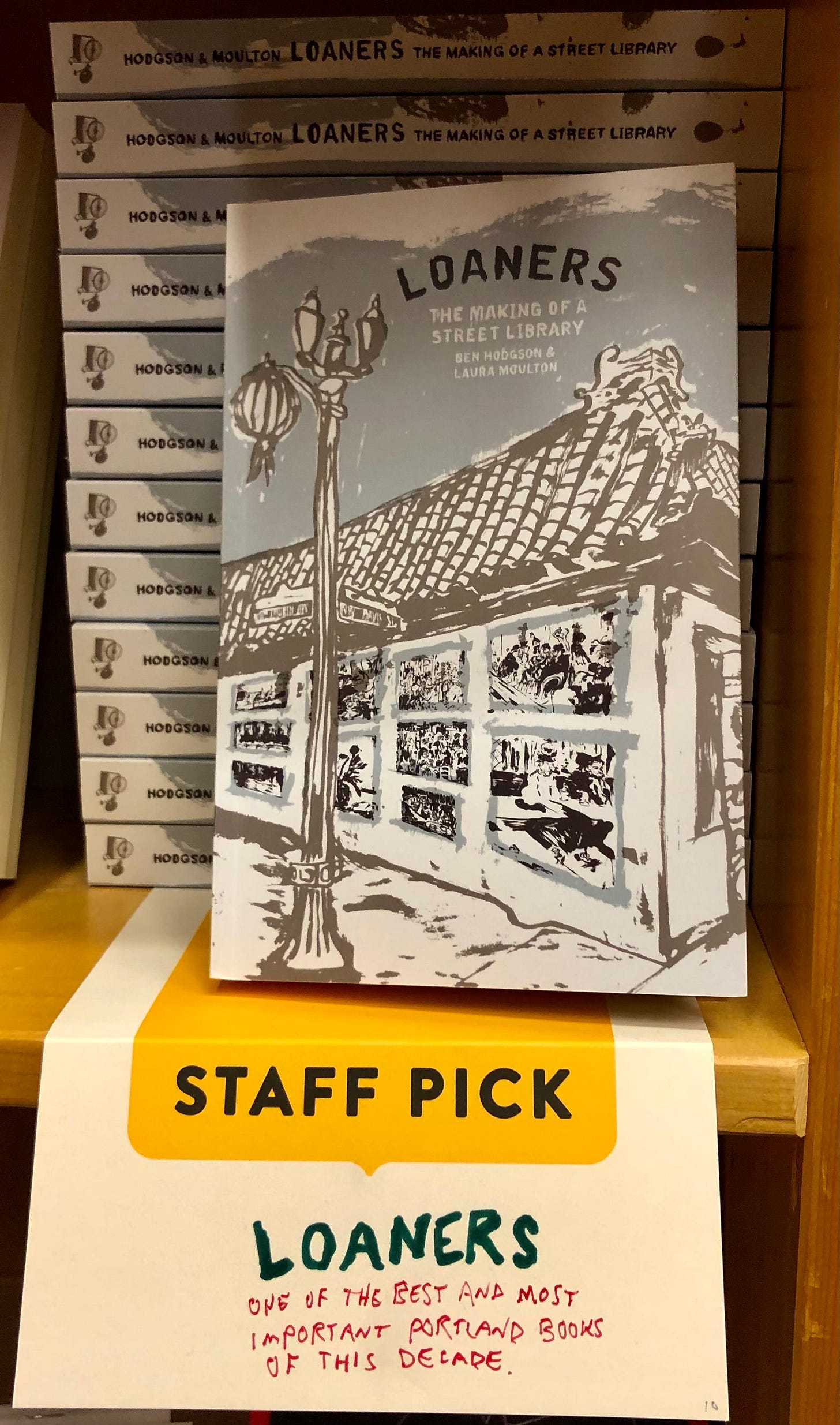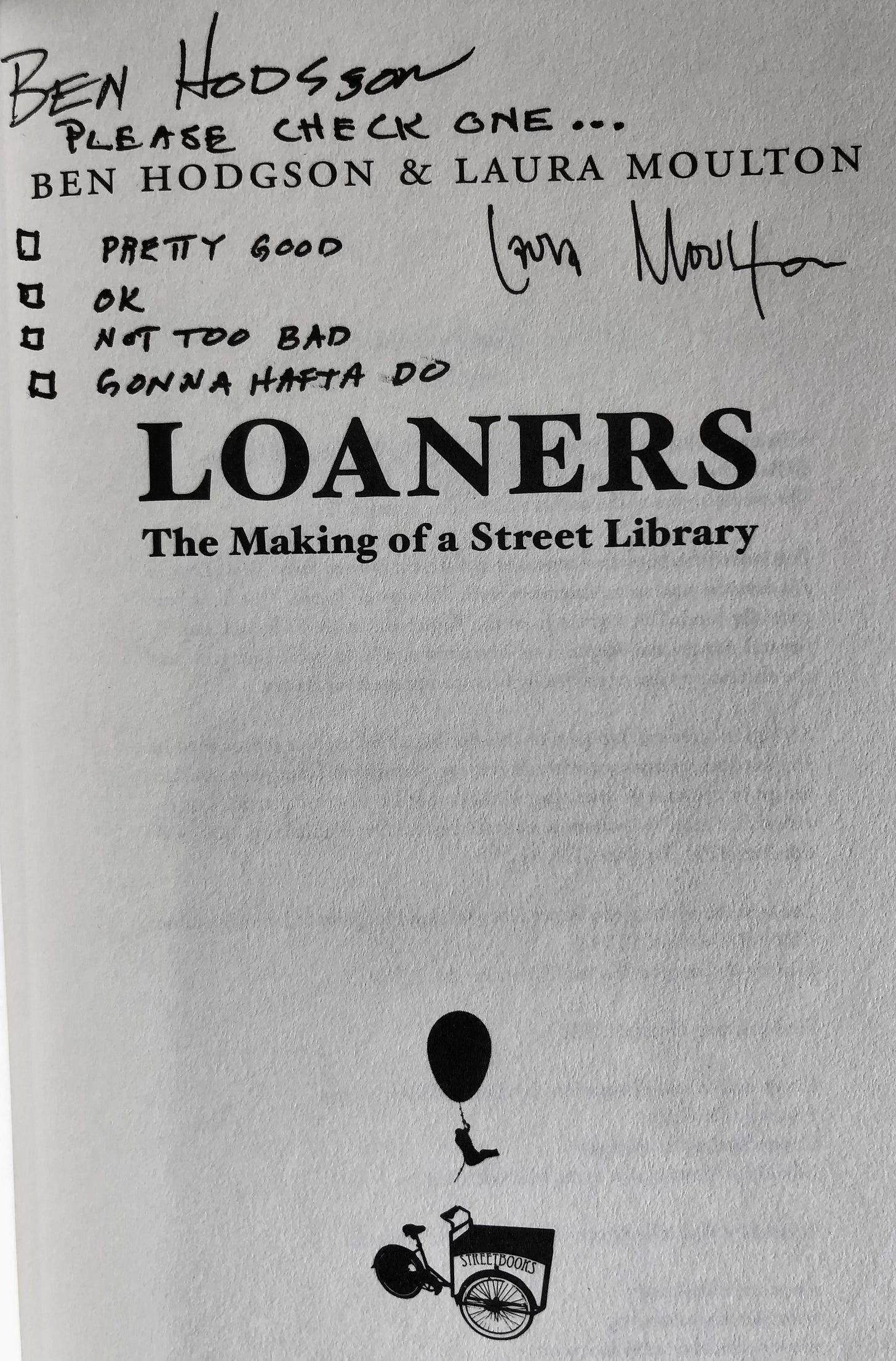AUG 5, 2023
Head east along I-84 out of Portland, as the Columbia River flows along your left, near milepost 40, and you’ll come to a tunnel. During the years that Ben “Hodge” Hodgson and I were working on our book, I’d take a deep breath going into that tunnel and as it went dark around me, I’d wish fervently: Please let us finish the book. That was the basic wish, with occasional variation on the theme: Please let Hodge live long enough for us to finish the book. Or, please let Hodge be well enough to enjoy the book if we do finish it.
Reader, we finished it. Hodge is alive and well, and to date, Loaners: The Making of a Street Library has sold nearly 3000 copies, with hundreds going out for free to our library patrons on the streets. I write a bit about the making of the book in the essay I wrote for Powells bookstore when we did a virtual event there, and I didn’t know then that we’d have the opportunity to visit so many different audiences: Book groups, neighborhood associations, faculty and students at Chemeketa Community College, high school students, and even a conference for scholarly publishing, where Hodge and I stepped into a hall full of hundreds of attendees to talk about Street Books.
It’s a lovely thing when people gather around a book, to hear the authors read from it, to ask questions. But it’s been particularly heartening to be able to have conversations with these same audiences that center on what can be done to address the growing number of people living outside in our city and country, and about what people can do to support their neighbors living without shelter or resources.

I recently visited the Columbia River Correctional Institution, where the aforementioned river ran past us, but not so that any of us could see it, (riverfront scenery not being a consideration when the place was built). I read from Loaners and listened to the writers in the workshop read from their own work. A. wrote of being driven to a new foster placement in stocking feet (so he wouldn’t run away), and T. described his regret at losing his temper and striking his wife. R. wrote about lying under a busy freeway overpass watching traffic pass overhead, feeling as lonesome as he’d ever been. Each voice was so distinct and I was struck by their willingness to write the less than heroic stories of their past, and also touched by the way they offered feedback and handled one another with care. The road to the CRCI is lined with listing RVs and parked cars, some on cinderblocks, ramshackle pallets formed into makeshift shelters. A mile or so of roadside neighborhood. It reminded me of a dispiriting board game, maybe the opposite of Monopoly, in which one tries to own everything, and more like a game board containing an assortment of players who have been dropped there with no token to hold their place on the squares, and no access to a get-out-of-jail-free card. So often at Street Books we encounter library patrons on the street who check out a book from us and say, “I was reading this when I got released from jail, but couldn’t take it with me, so now I can finally finish it.” I’ve thought a lot about how the mark of a civilized society surely must be a policy (at the bare minimum) of sending a person who’s being released from incarceration with the paperback book they’re partway through. It represents a kind of hope for the next part of their journey, a vote of confidence that they’ll finish this book and then pick up the next one. And how amazing it would be to put books in every prison across the United States. The esteemed writer and lawyer Reginald Dwayne Betts is working on something like that, which gives me a lot of hope.
Hodge and I recently traveled to the Gorge, where we visited a community center in rural Washington, read from Loaners and answered questions. Afterwards, I watched a woman from the audience take Hodge’s hand in both of hers and tell him what a fine writer he is. I saw him smile and shrug in deference, but I know how much that meant to him. Later on the way home, we passed by milepost 40 and I felt my heart thump an extra beat. Thank you, tunnel.

Truth: Cast back through your life and find a regret, perhaps a memory of yourself in which you were less than heroic. Write it with as much unvarnished truth and detail as you can.
Dare: Find a copy of a book you love very much and/or one you think is important for people to read.
Then give it to somebody.
P.S. The Street Books crew does a quarterly book group and discussion. We just finished Poverty, by America, by Matthew Desmond and I wish everybody would read it. Especially those of us who are most comfortable. I also recommend The Sum of Us: What Racism Costs Everyone and How We Can Prosper Together, by Heather McGhee.